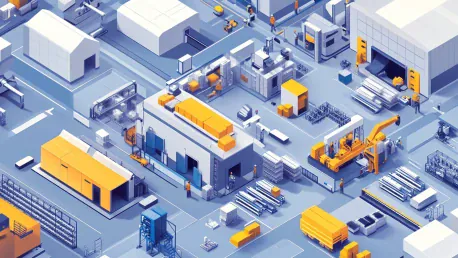Smart manufacturing is revolutionizing the packaging industry by integrating advanced technologies and automation into traditional processes. This transformation enhances efficiency and promotes sustainability through a closed-loop system where waste is minimized, and resources are reused and recycled. By shifting away from the traditional linear “take-make-dispose” model, smart manufacturing ensures that resource depletion and environmental degradation are significantly reduced. The synergistic relationship between smart manufacturing and sustainable packaging practices is underscored by the comprehensive use of modern technologies to create more efficient, connected, and data-driven manufacturing systems.
The Role of Connectivity in Smart Manufacturing
Connectivity is foundational to smart manufacturing, enabling seamless communication among machines, sensors, and devices. This interconnected ecosystem permits manufacturers to monitor production performance in real time, furnishing actionable insights that optimize operations and minimize inefficiencies. By refining overall production management, connectivity reduces resource depletion and curtails environmental impact. In a connected manufacturing environment, real-time data flows continuously between different components of the production line, allowing for immediate adjustments and improvements to maintain process efficiency and sustainability.
The ability to track and analyze data also helps identify areas where energy consumption can be reduced, furthering sustainability goals. This real-time data exchange ensures that the manufacturing process is as efficient as possible, reducing waste and enhancing resource utilization. Consequently, manufacturers can pinpoint high-energy consumption areas and implement modifications to save energy, reduce emissions, and lower the potential for waste. Enhanced connectivity thus plays a critical role in creating a more sustainable packaging process.
Predictive Maintenance and Its Impact on Sustainability
Predictive maintenance, another cornerstone of smart manufacturing, significantly contributes to sustainability by using advanced technologies to monitor equipment performance and predict maintenance needs, thereby preventing costly downtime. This proactive approach extends machine lifespan and reduces the resource consumption associated with reactive maintenance. By ensuring that machinery operates at peak efficiency, predictive maintenance reduces energy consumption and minimizes waste, lowering operational costs and supporting environmental sustainability.
The benefits of predictive maintenance extend beyond merely preventing equipment failure. By optimizing machine performance, manufacturers can reduce their carbon footprint and enhance overall sustainability. This approach minimizes resource depletion and enhances the operational efficiency of manufacturing processes. Predictive maintenance exemplifies how the proactive integration of technology into manufacturing can lead to substantial resource conservation and reduced environmental impact, reinforcing the importance of smart manufacturing in promoting sustainable practices within the packaging industry.
Automation Streamlining Packaging Processes
Automation plays a pivotal role in smart manufacturing by facilitating the rapid adaptation of production lines and streamlining workflows. In the packaging sector, automation addresses inefficiencies and removes bottlenecks, leading to reduced consumption and waste. For instance, the traditional production of plastic bottles entails multiple separate processes for different components like caps, labels, and the bottles themselves. By simplifying supply chains and opting for materials with lower plastic content, automation can streamline these processes and cut down on environmental impact.
Innovations in packaging design, such as flexible liquid packaging with self-sealing features, further illustrate the effectiveness of automation. These designs minimize the need for additional materials, such as caps and closures, thereby simplifying production and reducing plastic waste. Automation not only boosts efficiency but also supports sustainability efforts by slashing material use and waste generation. These advancements underscore the potential of automation to revolutionize the packaging industry, making it more sustainable and efficient, ultimately leading to cost savings and a reduced environmental footprint.
Innovations in Packaging Design
Innovative packaging design is a key driver of sustainability in the packaging industry. Smart manufacturing technologies enable the development of new solutions that cut material usage and streamline production processes. For example, flexible liquid packaging can replace traditional bottles, providing recyclability and reducing the number of touchpoints in production. These designs not only minimize waste but also enhance overall sustainability by using fewer materials and incorporating features that improve recyclability.
Manufacturers benefit from cost savings while reducing their environmental footprint. Moreover, these designs often lead to economic viability for sustainable packaging solutions. Innovations like this exemplify how smart manufacturing can foster a more sustainable packaging industry by embracing advanced technologies and new design concepts. The impact of these designs is far-reaching, contributing to long-term environmental resilience and sustainability.
Energy Efficiency in Smart Manufacturing
Energy consumption is a critical factor in achieving sustainability within manufacturing. Smart manufacturing technologies enable manufacturers to assess and pinpoint the most energy-intensive aspects of their production processes, allowing them to implement modifications that save kilowatt-hours of energy, reduce gas and carbon emissions, and lower waste-to-landfill potential. Efforts to optimize machine operations, employ energy-efficient equipment, and incorporate renewable energy sources all play a part in reducing operational costs and environmental impact.
By prioritizing energy efficiency, manufacturers make significant strides toward sustainability goals. Energy-efficient practices lower the carbon footprint of manufacturing processes, creating a ripple effect that benefits the environment at large. Sustainable practices embed throughout the manufacturing process, reinforcing the industry’s commitment to environmental responsibility. Smart manufacturing’s focus on energy efficiency emphasizes its crucial role in driving packaging sustainability and shaping a greener future for the industry.
Enhancing the Circular Economy
Smart manufacturing is transforming the packaging industry by incorporating advanced technologies and automation into conventional processes. This shift boosts efficiency and fosters sustainability through a closed-loop system that minimizes waste and emphasizes resource reuse and recycling. Moving away from the traditional linear “take-make-dispose” model, smart manufacturing greatly reduces resource depletion and environmental harm. The interconnected relationship between smart manufacturing and sustainable packaging practices is highlighted by the extensive use of modern technologies, which help develop more efficient, interconnected, and data-driven production systems. Enhanced automation tools and real-time data analytics allow for more precise manufacturing processes, leading to reduced material usage and lower greenhouse gas emissions. As a result, companies can achieve significant cost savings while also meeting evolving environmental regulations and consumer demands for greener products. In summary, the integration of smart manufacturing into the packaging industry not only optimizes the production processes but also champions environmental responsibility, creating a more sustainable future.









